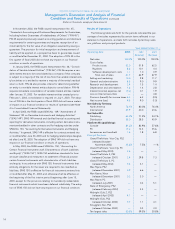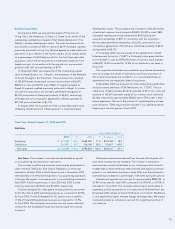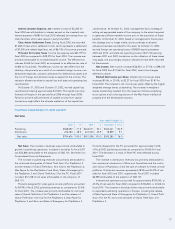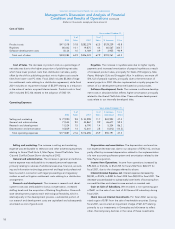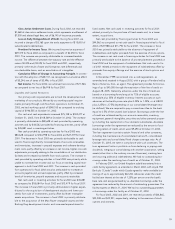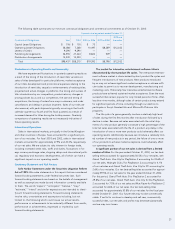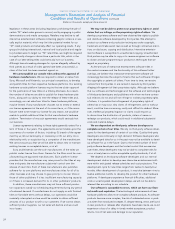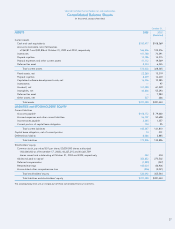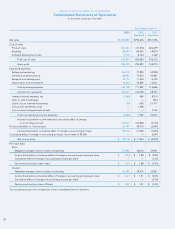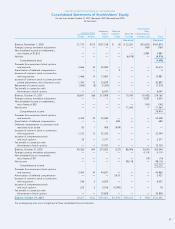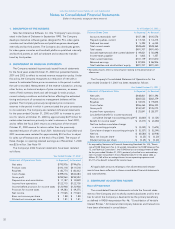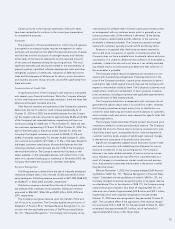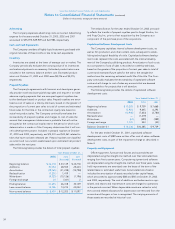2K Sports 2003 Annual Report Download - page 26
Download and view the complete annual report
Please find page 26 of the 2003 2K Sports annual report below. You can navigate through the pages in the report by either clicking on the pages listed below, or by using the keyword search tool below to find specific information within the annual report.
legislation in these areas (including legislation prohibiting the sale of
certain “M” rated video games to minors) and by engaging in public
demonstrations and media campaigns. Retailers may decline to sell
interactive entertainment software containing graphic violence or sex-
ually explicit material, which may limit the potential market for our
“M” rated products and adversely affect our operating results. If any
groups (including international, national and local political and regula-
tory bodies) were to target our “M” rated titles, we might be required
to significantly change or discontinue a particular title, which in the
case of our best-selling titles could seriously hurt our business.
Although lawsuits seeking damages for injuries allegedly suffered by
third parties as a result of video games have been unsuccessful, a
claim of this kind has been asserted against us.
We cannot publish our console titles without the approval of
hardware manufacturers. We are required to obtain a license from
Sony, Microsoft and Nintendo, our principal competitors, to develop
and publish titles for their respective hardware platforms. Our existing
hardware console platform licenses require that we obtain approval
for the publication of new titles on a title-by-title basis. As a result,
the number of titles we are able to publish for these hardware plat-
forms, along with our ability to time the release of these titles and,
accordingly, our net sales from titles for these hardware platforms,
may be limited. If any manufacturer chooses not to renew or extend
our license agreement at the end of its current term, or if the manu-
facturer were to terminate our license for any reason, we would be
unable to publish additional titles for that manufacturer’s hardware
platform. Termination of any such agreements would seriously hurt
our business.
License agreements relating to these rights generally extend for a
term of three or four years. The agreements are terminable upon the
occurrence of a number of factors, including: (1) breach of the agree-
ment by us; (2) our bankruptcy or insolvency; or (3) our entry into a
relationship with, or acquisition by, a competitor of the manufacturer.
We cannot assure you that we will be able to obtain new or maintain
existing licenses on acceptable terms, or at all.
Sony and Nintendo are the sole manufacturers of the titles we
publish under license from them. Games for the Xbox must be man-
ufactured by pre-approved manufacturers. Each platform license
provides that the manufacturer may raise prices for the titles at any
time and grants the manufacturer substantial control over the
release of new titles. Each of these manufacturers also publishes
software for its own platforms and manufactures titles for all of its
other licensees and may choose to give priority to its own titles or
those of other publishers if it has insufficient manufacturing capacity
or if there is increased demand for its or other publishers’ products.
In addition, these manufacturers may not have sufficient produc-
tion capacity to satisfy our scheduling requirements during any period
of sustained demand. If manufacturers do not supply us with finished
titles on favorable terms without delays, our operations would be
materially interrupted and we would be unable to obtain sufficient
amounts of our product to sell to our customers. If we cannot obtain
sufficient product supplies, our net sales will decline and we could
incur losses.
We may not be able to protect our proprietary rights or avoid
claims that we infringe on the proprietary rights of others. We
develop proprietary software and have obtained the rights to publish
and distribute software developed by third parties. We attempt to
protect our software and production techniques under copyright,
trademark and trade secret laws as well as through contractual restric-
tions on disclosure, copying and distribution. Interactive entertain-
ment software is susceptible to unauthorized copying. Unauthorized
third parties may be able to copy or to reverse engineer our software
to obtain and use programming or production techniques that we
regard as proprietary.
As the amount of interactive entertainment software titles in
the market increases and the functionality of this software further
overlaps, we believe that interactive entertainment software will
increasingly become the subject of claims that such software infringes
the copyrights or patents of others. From time to time, we receive
notices from third parties or are named in lawsuits by third parties
alleging infringement of their proprietary rights. Although we believe
that our software and technologies and the software and technologies
of third-party developers and publishers with whom we have contrac-
tual relations do not and will not infringe or violate proprietary rights
of others, it is possible that infringement of proprietary rights of
others has or may occur. Any claims of infringement, with or without
merit, could be time consuming, costly and difficult to defend. More-
over, intellectual property litigation or claims could require us
to discontinue the distribution of products, obtain a license or
redesign our products, which could result in additional substantial
costs and material delays.
We are dependent on third-party software developers to
complete certain of our titles. We rely on third-party software devel-
opers for the development of certain of our titles. Quality third-party
developers are continually in high demand. Software developers who
have developed titles for us in the past may not be available to devel-
op software for us in the future. Due to the limited number of third-
party software developers and the limited control that we exercise
over them, these developers may not be able to complete titles for
us on a timely basis or within acceptable quality standards, if at all.
We depend on third-party software developers and our internal
development studios to develop new interactive entertainment soft-
ware within anticipated release schedules and cost projections. The
development cycle for new titles ranges from twelve to twenty-four
months. After development of a product, it may take between nine to
twelve additional months to develop the product for other hardware
platforms. If developers experience financial difficulties, additional
costs or unanticipated development delays, we will not be able to
release titles according to our schedule.
Our software is susceptible to errors, which can harm our finan-
cial results and reputation. The technological advancements of new
hardware platforms allow more complex software products. As software
products become more complex, the risk of undetected errors in prod-
ucts when first introduced increases. If, despite testing, errors are found
in new products or releases after shipments have been made, we could
experience a loss of or delay in timely market acceptance, product
returns, loss of net sales and damage to our reputation.
TAKE-TWO INTERACTIVE SOFTWARE, INC. AND SUBSIDIARIES
Management’s Discussion and Analysis of Financial
Condition and Results of Operations (continued)
(Dollars in thousands, except per share amounts)
24


